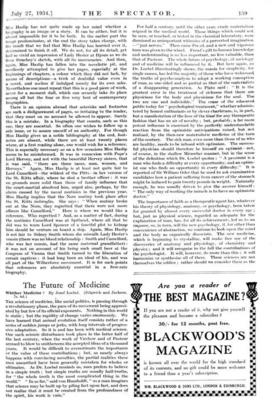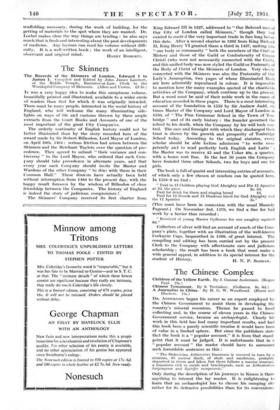The Future of Medicine THE science of medicine, like social
politics, is passing through a revolutionary phase, the pace of its movement being appreci- ated by but few of its official exponents. Nothing in this world is static ; but the rapidity of change varies enormously. We have learned that animal evolution itself consists rather of a series of sudden jumps or jerks, with long intervals of progres- sive adaptation. So it is and has been with medical science. One such seismic disturbance took place in the latter half of the last century, when the work of Virchow and of Pasteur seemed to blow to smithereens the accepted ideas of a thousand years. It would be difficult to overestimate the importance or the value of these contributions ; but, as nearly always happens with convincing novelties, the partial realities these men unearthed have been generally mistaken for wholes or ultimates. As Dr. Loebel reminds us, man prefers to believe in a simple truth ; but simple truths are usually half-truths, for " the whole truth is the most complicated thing in the world." " In so far," said von Humboldt, " as a man imagines that science may be built up by piling fact upon fact, and does not realize that it must be created from the profoundness of the spirit, his work is vain." For half a century, until the other year, crude materialism reigned in the medical world. Those things which could not be seen, or touched, or tested in the chemical laboratory, were dismissed as unimportant whimsies of a perverted imagination —"just nerves." Then came Fread, and a new and vigorous turn was given to the wheel. Freud's gift to human knowledge and understanding is no less important, no less valuable, than that of Pasteur. The whole future of psychology, of sociology and of medicine will be influenced by it. But here again, as Dr. Loebel illuminatingly shows, the mania for simplicity, for single causes, has led the majority of those who have welcomed. the truths of psycho-analysis to adopt a working conception of' man, as one-sided and as partial as that of the materialists of a disappearing generation. As Plato said : " It is the greatest error in the treatment of sickness that there are physicians for the body and physicians for the soul. The two are one and indivisible." The craze of the educated public today for psychological treatment," whether adminis- tered by honest enthusiasts or by clever charlatans, is, in part, but a manifestation of the love of the blasé for any therapeutic fashion that has an air of novelty ; but, probably, a far more potent influence is exercised by the perfectly understandable reaction from the optimistic anticipations raised, but not realized, by the then-new materialistic medicine of the turn of the century. The sick man, even more than those of us who are healthy, needs to be infused with optimism. The success- ful 'physician should therefore be himself an optimist—not, of course, in the shallow Micawber manner, but in the sense of the definition which Dr. Loebel quotes " A pessimist is a man who finds a difficulty at every opportunity; and an optim- ist one who finds an opportunity in every difficulty." It is reported of Sir William Osier that he used to ask examination candidates how a patient suffering from cancer of the stomach might be induced to gain twenty pounds in weight. Naturally enough, he was usually driven to give the answer himself : " The only way of working the miracle is to have an optimistic doctor."
The importance of faith as a therapeutic agent has, whatever his theory of physiology, anatomy, or psychology, been taken for granted by almost every successful doctor in every age ; but, just as physical science, regarded as adequate for the explanation of man, has, for all its achievements, led us to an impasse, so, in turn, will the new psychology, if, for other than convenience of abstraction, we continue to took upon the mind and the body as organically dissociate. The new medicine, which is beginning to crystallize, will make free use of the discoveries of anatomy and physiology, of chemistry and physics ; and it will recognise to the full the contributions of the psychologist. It will, however, do more than this ; it will harmonize or synthesize all of them. These sciences are not themselves the edifice ; rather should we consider them as the scaffolding necessary, during the work of building, for the getting of materials to the spot where they are wanted. Dr. Loebel makes clear the way things are tending : he also says much that is fresh and interesting about the past developments of medicine. Any layman can read his volume without diffi- culty-. It is a well-written book ; the work of an intelligent, observant and original mind.
HARRY ROBERTS.



































 Previous page
Previous page